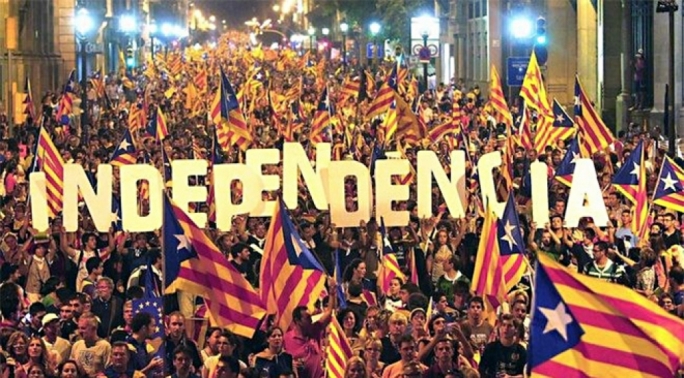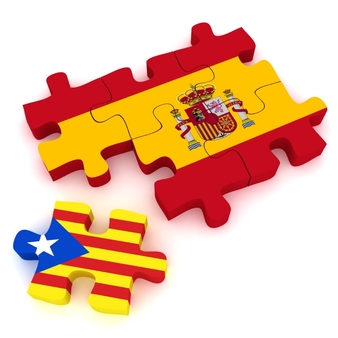
Why does Catalonian independence mean opening the economic Pandora’s box?
Economy 12 October 2015The 27th of September 2015 will notably remain in the memory of the citizens of Spanish autonomous province Catalonia who have voted in the Parliamentary elections, in which the most participants were pro-independence political parties/coalitions.
According to the official data provided by the Catalan Government, staggering 77.4% of total registered voters, used their right and voted. A pro-independence coalition “Together for YES” (Junts pel Si – JxSi) took a convincing victory with more than 39.5 per cent of total votes, and won 62 seats (out of total 135) within the Catalan Parliament. It was followed by pro-Spanish oriented Citizens` (Ciudadanos – C`s) party, which opposes Catalan independence. With its 25 seats in the newest composition of Catalan Parliament, it will try to oppose the predominant opinion of the majority. The possible independence status of this entity potentially opens economic Pandora’s box with many key issues to which there are no clear answers.
Is it only about political independence?
The highest turnout than ever (more than 77% of total voters who voted) in the last Catalonian Parliamentary elections showed, among other relevant reasons, that it had more a referendum than parliamentary character.The debate between protagonists and antagonists of the story of independence has always ended with the predominant question about the future status of the province, equivalent to Hamlet’s dilemma “to be(come) or not to be(come) a new born country”? A triumphant victory of the JxSi coalition, led by Raül Romeva, has finally resolved the dilemma, but it has simultaneously open many other debates of the future paths Catalonia should follow.
As promised on the official website of the elections, “if on the 27 September pro-independence parties obtain the majority at the Parliament this will mean that the Catalan people have given a clear, democratic and unmistakable mandate for its Parliament to advance towards independence. At that point, the Parliament and the Government of Catalonia will start negotiations with Spain and the international community to achieve the best way to implement this mandate.”
And while pro-independence coalition, with its “clear and democratic mandate” is preparing to start negotiations with Central Government in Madrid, the main external obstacle will be an implicitly unpredictable attitude coming from the international community. Who will Catalonia primarily address to? Brussels? Washington? Paris? Berlin? Surely, beside the first recipients of “Catalan birth”, there will be a tough lobbying game in East River for entering the UN.
Political recognition by the countries and international organizations will progress depending on Spanish diplomatic contra-lobbying goals. It is certain that Spain will try to block Catalonia in its efforts to join United Nations, European Union, NATO and other relevant organizations.
But what will happen with its economy?
After the end of global economic crisis, Spanish economy is in its phase of stagnation. According to Spanish statistical Office (INE), economic growth of Spain in 2014 was merely 0.3%, while the World Bank predictions for 2015 are also gloomy.
On the other hand, Catalonia is the biggest contributor to the Spanish GDP. It provides more than 20% of overall national GDP. With approximately 7.5 million inhabitants, it ranks as the second highest populated province in Spain. This economic-growing tiger has achieved French level of GDP per capita in amount of 27 700 euros in 2012, which is even higher than the EU-28 GDP per capita (25 500 euros). What makes these numbers even more impressive, is the fact that some 65% of total Spanish exportation to the Member States of the EU comes from Catalonia. If this province declares independence that will definitely mean a short-term shock for Spanish domestic trade and a knock-on effect to its economy as a whole. That will also probably mean that Madrid will strive to make trade more difficult between newly born state and the rest of the country, at least at the very beginning of its independence. Catalonia will have to pay high taxes for its exportation to the EU Member States, according to the statements previously made by the EU officials during the referendum in Scotland. They clearly explained that “if an entity obtains independence from a Member State, this will automatically mean that this entity has to start its negotiations of accession from the very beginning”.
In other words, Catalonia will have an extreme problem at the beginning, until it signs Stabilization and Accession Agreement with the EU, which will liberalize trade between the Union and Catalonia. These steps are extremely important for an EU-oriented export of Catalonia.
Pre-electoral parties` economic programs
General impression of pre-electoral programs and ideas, offered during the campaign, was stressing the political idea(s) of Catalan independence at the expense of economic and other relevant issues.
General impression of pre-electoral programs and ideas, offered during the campaign, was stressing the political idea(s) of Catalan independence at the expense of economic and other relevant issues. Economic messages, scarcely heard during the electoral campaign, have been focused on ordinary concerns such as the ongoing economic crisis, better living standards, fiscal reforms etc. In such a mixture of dispersed economic messages, combined with highlighted political tones, it was very confusing for an average voter to clearly and easily decide which party to entrust his/her vote. The leading political coalition that won the elections – JxSi, was rather focusing on the issue of independence than presenting ideas for economic progress of Catalonia; therefore, minimal efforts have been made by the coalition in economic area during the pre-electoral campaign.
Citizens` party (C`s) has split its platform for achieving economic goals into five parts. They defined their platform into a circle process consisted of anti-crisis measures, then entrepreneurship innovations, then getting to fair and sustainable tax system followed by the fourth part embodied in education in the widest sense, which will consequently lead to combating corruption and crony capitalism.
Socialists` party of Catalonia (PSC) has used quite populist approach in the economic part of its electoral campaign. Beside emphasizing the economic growth and job creation as a key way of “recovery” of Catalan economy, its main trump of gaining the voting-body`s confidence were reforms and reorganization of the resources and tax incomes.
A left-wing coalition “Catalonia Yes We Can” (CSQEP) has been focusing on more concrete economic goals such as repealing of the law of budgetary stability, ending the cuts in public sector, solidarity and fair tax reforms, recovering social and labor conquests, enough cuts to health by stopping and reversing the process of prioritization of private interests in public health, and creating a plan against women poverty.
What about future currency?
Catalonian Statute of Autonomy which is perceived as the “future constitution” by the Catalans, does not specify the currency issue, but stipulates that The Generalitat (Catalan Government) has an exclusive power over planning and regulating its finances.
In an interview for Catalan News Agency (in 2013), the president of Catalan government Mr. Artur Mas emphasized that it was crystal clear that “whatever Catalonia decides [regarding its independence from Spain], it will have the Euro as its currency”. This statement may indubitably determine the answer to the very important, not only economic, but political question of the future path of independent Catalonia. If Catalonia keeps the euro as its own currency, it can be interpreted as political will of Catalan authorities to join the EU. There still remains an issue concerning future international position of new-born state. The sphere of the economy will for sure be under the influence of political recognition and accession to the international fora and organizations such as the UN, EU, NATO and others. However, bearing in mind that this statement occurred two years ago, when Mr. Mas was leading the Convergence and Union party, it should be interpreted with a dose of moderation, especially nowadays when he won the elections with even more radical separatist ideas.
What if…?
Although the vote was billed as a plebiscite on independence, it still means nothing unless the real referendum is set. Catalan officials now know the approximate vote dispersal within their voting bodies, but they do not know what will happen if Catalonia obtains full sovereignty over its territory. How will its independence be perceived by the international community? Will financial and political institutions and organizations grant Catalonia a membership immediately? What will be the first priorities of the Government in keeping the economy stable? How will that affect their industry, trade, exportation, services, life standard? Opening the economic Pandora’s box could bring even more concerns than solutions.



